
Pope John XXIII was head of the Catholic Church and sovereign of the Vatican City State from 28 October 1958 until his death in 1963. Angelo Giuseppe Roncalli was one of thirteen children born to Marianna Mazzola and Giovanni Battista Roncalli in a family of sharecroppers who lived in Sotto il Monte, a village in the province of Bergamo, Lombardy. He was ordained to the priesthood on 10 August 1904 and served in a number of posts, as nuncio in France and a delegate to Bulgaria, Greece and Turkey. In a consistory on 12 January 1953 Pope Pius XII made Roncalli a cardinal as the Cardinal-Priest of Santa Prisca in addition to naming him as the Patriarch of Venice. Roncalli was unexpectedly elected pope on 28 October 1958 at age 76 after 11 ballots. Pope John XXIII surprised those who expected him to be a caretaker pope by calling the historic Second Vatican Council (1962–1965), the first session opening on 11 October 1962.
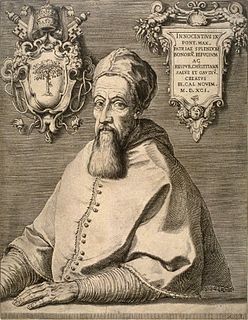
Pope Innocent IX, born Giovanni Antonio Facchinetti, was head of the Catholic Church and ruler of the Papal States from 29 October to 30 December 1591.
Papabile is an unofficial Italian term first coined by Vaticanologists and now used internationally in many languages to describe a Catholic man, in practice always a cardinal, who is thought a likely or possible candidate to be elected pope. In some cases the cardinals will choose a papabile candidate. Among the papabili cardinals who have been elected pope are Eugenio Pacelli, Giovanni Battista Montini, and Joseph Ratzinger. However, at times the College of Cardinals elects a man who was not considered papabile by most Vatican watchers. In recent years those who were elected pope though not considered papabile include John XXIII, John Paul I, John Paul II. There is a saying among Vaticanologists: "He who enters the conclave as pope, leaves it as a cardinal." This is a popular proverb in Italy as well, indicating one should never be too sure of oneself.

The Patriarch of Venice is the ordinary bishop of the Roman Catholic Archdiocese of Venice. The bishop is one of the few patriarchs in the Latin Church of the Catholic Church. Presently, the only advantage of this purely formal title is the bishop's place of honor in papal processions. In the case of Venice, an additional privilege allows the patriarch, even if he is not a cardinal, the use of the colour red in non-liturgical vestments. In that case, the red biretta is topped by a tuft, as is the custom with other bishops who are not cardinals.

Angelo Scola is an Italian Cardinal of the Catholic Church, philosopher and theologian. He was Archbishop of Milan from 2011 to 2017. He had served as Patriarch of Venice from 2002 to 2011. He has been a cardinal since 2003 and a bishop since 1991.
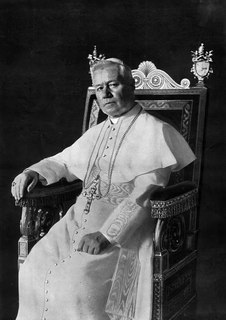
The 1903 papal conclave followed the death of Pope Leo XIII after a reign of 25 years. Some 62 cardinals participated in the balloting. Emperor Franz Joseph of Austria asserted the right claimed by certain Catholic rulers to veto a candidate for the papacy, blocking the election of the leading candidate, Cardinal Secretary of State Mariano Rampolla.
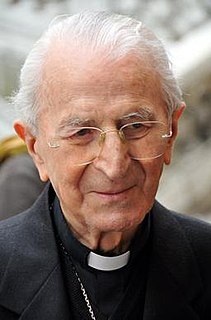
Marco Cé was an Italian cardinal of the Roman Catholic Church. He served as the Patriarch of Venice from 1978 to 2002 and was elevated to the cardinalate in 1979.
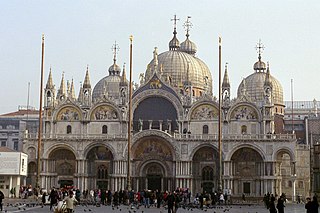
The Patriarchate of Venice, also sometimes called the Archdiocese of Venice, is a Latin Church ecclesiastical territory or patriarchal archdiocese of the Catholic Church in Venice, Italy. In 1451 the Patriarchate of Grado was merged with the Bishopric of Castello and Venice to form the Archdiocese of Venice.

University of Perugia is a public-owned university based in Perugia, Italy. It was founded in 1308, as attested by the Bull issued by Pope Clement V certifying the birth of the Studium Generale.
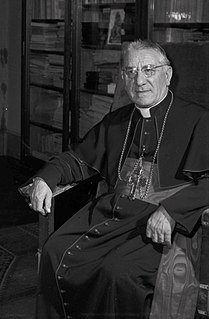
Adeodato Giovanni Piazza, O.C.D. was an Italian friar of the Discalced Carmelite Order, who became a cardinal of the Roman Catholic Church, and Patriarch of Venice, as well as a member of the Roman Curia in Vatican City.
Licentiate of Canon Law is the title of an advanced graduate degree with canonical effects in the Roman Catholic Church offered by pontifical universities and ecclesiastical faculties of canon law. Licentiate is the title of a person who holds an academic degree called a licence. The licentiate of canon law is the ordinary way for forming future canonists, according to Veritatis gaudium.

The Roman Catholic Diocese of Padua is an episcopal see of the Catholic Church in Veneto, northern Italy. It was erected in the 3rd century. The diocese of Padua was originally a suffragan (subordinate) of the Patriarchate of Aquileia. When the Patriarchate was suppressed permanently in 1752, it became a suffragan of the Archdiocese of Udine. In 1818, when the dioceses of northern Italy were reorganized by Pope Pius VII, it became a suffragan of the Patriarchate of Venice, and remains so today.
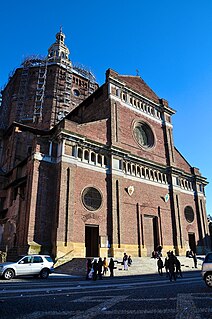
The Diocese of Pavia is a see of the Catholic Church in Italy. It has been a suffragan of the Archdiocese of Milan only since 1817. Previous to the reorganization of the hierarchy in northern Italy by Pope Pius VII after the expulsion of the French and the Congress of Vienna, the diocese of Pavia had depended directly upon the Holy See, despite repeated failed attempts on the part of the Archbishops of Milan to claim control. The diocese has produced one Pope and Patriarch of Venice, and three cardinals.

The Roman Catholic Diocese of Concordia-Pordenone is situated in northeastern Italy, at the northern end of the Adriatic Sea, between Venice and Udine. Since 1818, Concordia Veneta, has been a suffragan of the Archdiocese of Venice. Bishop Andrea Casasola attended the Provincial Council of the Provincia Veneta in October 1859 as a suffragan of the Patriarch of Venice, Cardinal Giuseppe Luigi Trevisanato. The name of the diocese was changed to its present form in 1971.
Giovanni Antonio Campani called Campanus, a protégé of Cardinal Bessarion, was a Neapolitan-born humanist at the court of Pope Pius II, whose funeral oration he wrote, followed by a biography, flattering but filled with personal reminiscence, written ca 1470-77. Campanus was famous for his Latin orations, poems and letters. In addition to Bessarion's Academy, Campanus was a member of the Roman circle of Pomponius Leto. After the death of the Pope in 1464, Campani taught at the Florentine Academy.

The Diocese of Treviso is Latin Church ecclesiastical territory or diocese of the Catholic Church in the Veneto, Italy. It is a suffragan diocese in the ecclesiastical province of the metropolitan Patriarchate of Venice.

The Italian Catholic Diocese of Chioggia is in the Veneto, at the southernmost point of the Laguna veneta. Until 1451, the diocese was a suffragan of the Patriarchate of Grado. On 8 October 1451, in the bull "Regis Aeterni", Pope Nicholas V abolished the patriarchate of Grado, and transferred its powers and privileges to the Archdiocese of Venice. Since then, Chioggia has been a suffragan of Venice.
The Oasis International Foundation is an interfaith foundation established in 2004. It was based on an idea of Cardinal Angelo Scola to promote mutual knowledge and understanding between Christians and Muslims, with special focus on the reality of Christian minorities in predominantly Muslim countries. Oasis relies on a network of international contacts. In addition to Cardinal Scola its Promotional Committee includes Patriarch Bechara Boutros al-Rahi (Lebanon), Cardinals Philippe Barbarin (Lyon), Josip Bozanic (Zagreb), Péter Erdő (Budapest), Christoph Schönborn (Vienna), Patriarch Fouad Twal (Jerusalem) and Bishops Camillo Ballin (Kuwait), Mounged El-Hachem, Paul Hinder (Emirates), Jean-Clément Jeanbart (Alep), Maroun Lahham (Tunis), Anthony Lobo (Islamabad), Francisco Javier Martínez (Granada) and Joseph Powathil (Changanacherry). The scientific committee includes Islam experts, philosophers, sociologists, historians and legal experts.

Francesco Moraglia is an Italian prelate of the Catholic Church. He has been Patriarch of Venice since March 2012; he is the first native of Genoa to hold that position. He was bishop of La Spezia-Sarzana-Brugnato from 2008 to 2012.
The Permanent Observer of Holy See to UNESCO is the representative of the Holy See to the United Nations Educational, Scientific and Cultural Organization (UNESCO), which is based in Paris. The Church also has representatives at the headquarters of the United Nations in New York and at the headquarters of a number of its other international bodies in Geneva and Nairobi.














